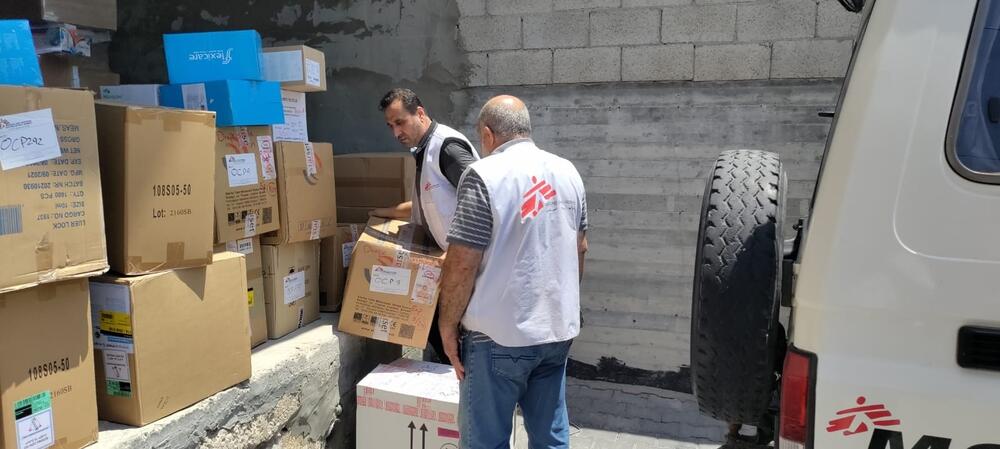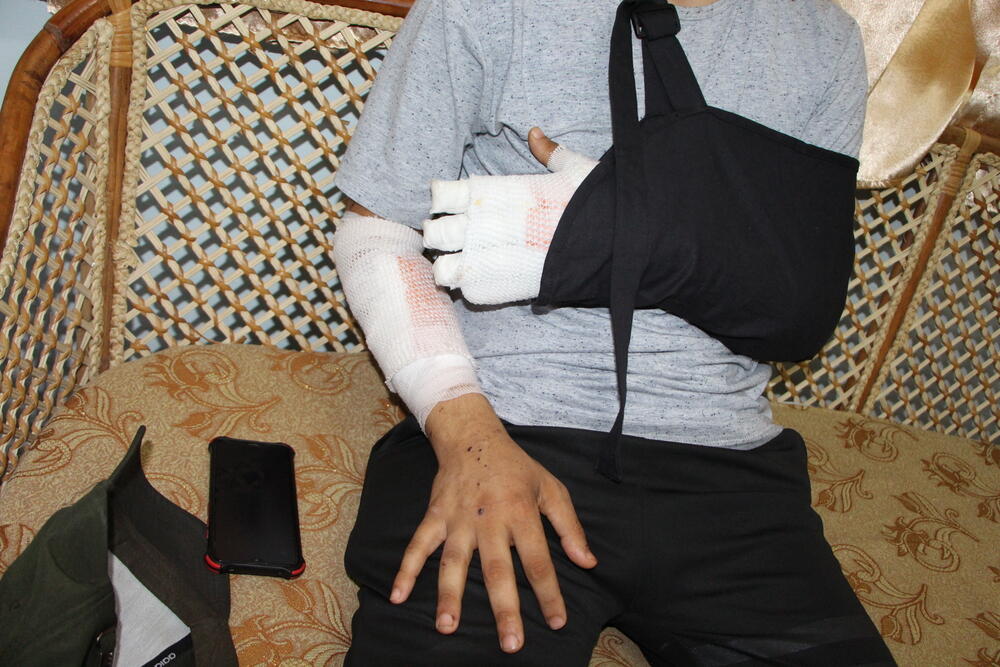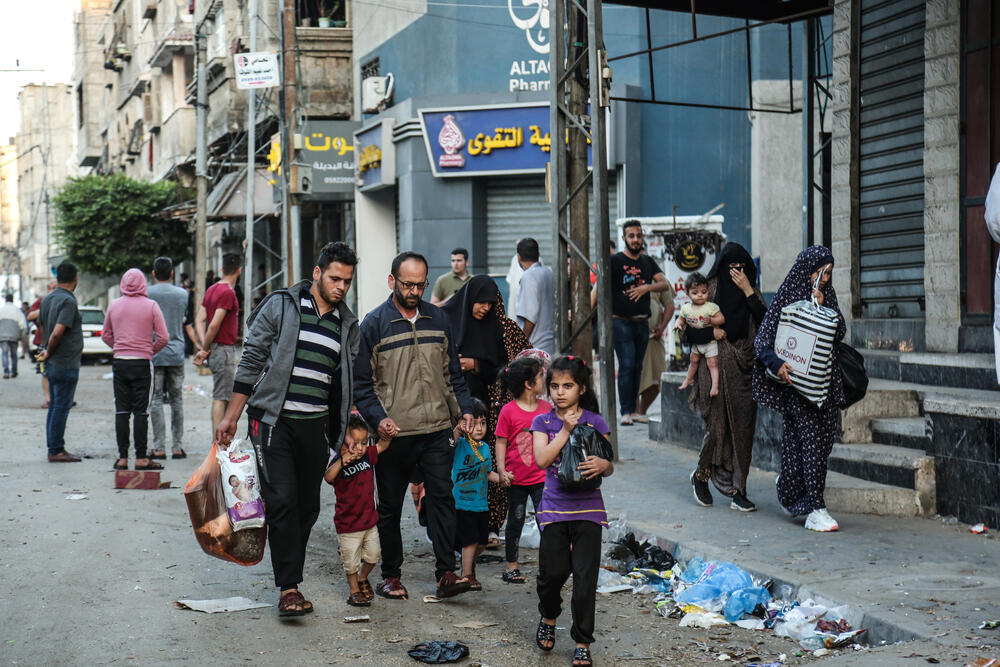MSF teams treat families injured in August escalation
Sakhar was asleep when a bomb hit his family home in Gaza City. Even then, he knew exactly what was happening.
That was before he lost consciousness, before being transported to the hospital, before coming to and realising that once again, he and his family had survived.
Sitting in a Médecins Sans Frontières / Doctors Without Borders (MSF) clinic in Gaza on 10 August, five days after the bombing and two days after a ceasefire was announced, he swipes through photos on his phone that were sent by his neighbours.
They show him and his brothers unconscious on the ground, faces covered in blood and cement dust. He marvels at the fact that they are still alive.
“Every time there’s an airstrike we have a huge amount of [injured people] that all come to the hospital at one time. You could have 50 or more patients at a time.”
Not only did Sakhar, who is 30 years old and a father of four, survive this August 2022 bombing, but he also survived another during the 2014 Gaza war, after which he needed skin grafts.
Today, his back is covered in fresh, open cuts. He has come to the clinic, with his two younger brothers – both of whom sustained severe fractures and abrasions – to have their dressings changed.
Their family are among the approximately 350 Gazans who sustained severe injuries during this round of escalation, joining the several thousand others who have been injured or disabled by one of the five wars on Gaza that have taken place in 15 years. This time around, according to the UN, 49 Gazans were killed, including 17 children.
Sakhar’s brothers, who are 22 and 13, recall how their lives have been shaped by their proximity to the trauma of war, despite repeatedly moving neighbourhoods to escape the destruction.
“During the 2008 war, I was in fourth grade,” says Mahmoud, the middle brother. “I remember as children we used to hear the explosions and see the [dead bodies].”
“In 2012, again we saw many injured and [dead people], and I lost many of my friends at the time. Then in [the 2014 war], our house was damaged.”
“We saw bad and horrible sights,” he says. “But not like this one.”
Treating physical and mental trauma
For Gazans like Sakhar and his brothers, the cycle of repeated wars has led to compounded physical and mental health traumas.
For healthcare workers too, scenes in emergency rooms have become all too familiar.
Dr Osama Tawfiq Hamad, an anaesthesiologist, was working on that Friday night when the bombs began to hit Gaza. As a doctor with MSF since 2019, he has provided care for patients through two wars.
He describes how the emergency room at Al-Awda Hospital filled up within minutes, receiving over 15 patients including six children.
He treated one young child who had been hit with shrapnel in their skull, and another with a haematoma (swelling of clotted blood) in their chest, both requiring urgent surgery.
“In Gaza, [in the past 15 years] we’ve had five wars, and every time there’s an airstrike we have a huge amount of [injured people] that all come to the hospital at one time,” he says.

Help us prepare for the next emergency
“You could have 50 or more patients at a time. In these moments, we have very bad emotions, anger and mixed emotions, but you must be strong to deal with the cases.”
“My son has been asking me to stop the war and he always screams at night. He has not slept for three nights and when he is asleep he wakes up from nightmares and starts running.”
Over time, for those patients that survive, returning to the hospital for follow-up surgery, physiotherapy, and support becomes part of their daily lives.
Shadi Al-Najjar, who manages the physiotherapy department at Al-Awda Hospital is familiar with the revolving door of patients that come in waves after each war.
“I am still seeing patients from the May 2021 escalation, getting rehabilitation and physiotherapy. In our department we have a high load of patients as well from the Great March of Return,” he says.
“We are now preparing the department, both in and out-patients, to receive the injured from this escalation.”
Impact on families
Shadi has returned to work, managing existing and new patients, despite his own experience over the weekend.
His home was partially destroyed on the second day of the war when his neighbour’s house was hit. His family didn’t have a chance to evacuate before his nine-month-old son’s room was damaged – he found him in his crib surrounded by glass and shrapnel, but injured. He says his youngest daughter has been traumatised, too.
“She is not able to sleep, crying all the time, I am trying to be as supportive as I can for them.”
Like Shadi, Sakher also emphasised that one of the worst parts of coping with the aftermath is in trying to support his children emotionally:
“My eldest is now five years old. And after this escalation, my son has been asking me to stop the war and he always screams at night. He has not slept for three nights and when he is asleep he wakes up from nightmares and starts running and I don’t know what to do or how to help him.”
The trauma of repeated violence in Gaza has made a discernible impact on children's and parents' mental health. According to the World Health Organization, 82 percent of adolescents in Gaza reported overall poor to very poor levels of mental wellbeing in 2021.
The UN’s 2022 Humanitarian Needs Overview states that more than half (53 percent) of all children in Gaza need child protection and mental health services. Additionally, 137,000 caregivers in Gaza require mental health services.
In the days following the escalation, MSF staff members and patients frequently expressed their concern for their children and other young people in Gaza who have grown up or will grow up in an environment where escalations take place with disturbing regularity.
After his wound dressings were changed, Wael, the 13-year-old brother of Sakhar and Mahmoud was asked by an MSF support worker what he wants for the future.
“I hope that there will be no wars in the future, and the calm [in Gaza] stays, without any bombings.”
MSF in Palestine
Palestine comprises parts of modern Israel and the Palestinian territories of the Gaza Strip and the West Bank.
This region, known as the Holy Land, holds religious significance for Christians, Muslims and Jews, and has been the object of conflicting claims, which has led to prolonged violence and, at times, open warfare.
Médecins Sans Frontières / Doctors Without Borders (MSF) first worked in Palestine in 1989.
Today, we provide medical and psychological assistance to people affected by the ongoing conflict, continuing our long-running mental health programmes on the West Bank and support to burns and trauma victims in the Gaza Strip.


